虚拟语气精讲
- 格式:pptx
- 大小:2.85 MB
- 文档页数:34
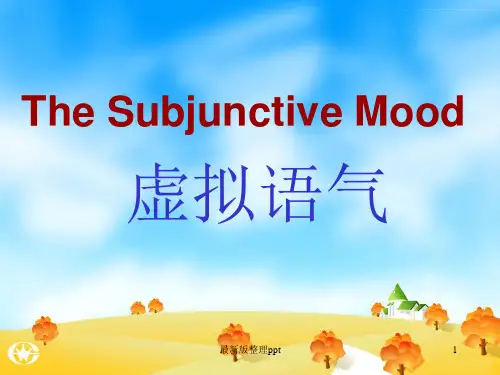
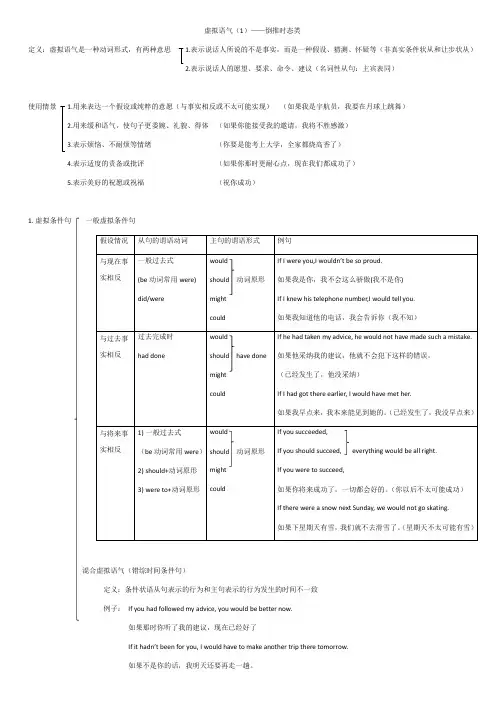
虚拟语气(1)——倒推时态类定义:虚拟语气是一种动词形式,有两种意思 1.表示说话人所说的不是事实,而是一种假设、猜测、怀疑等(非真实条件状从和让步状从)2.表示说话人的愿望、要求、命令、建议(名词性从句:主宾表同)使用情景 1.用来表达一个假设或纯粹的意愿(与事实相反或不太可能实现)(如果我是宇航员,我要在月球上跳舞)2.用来缓和语气,使句子更委婉、礼貌、得体(如果你能接受我的邀请,我将不胜感激)3.表示烦恼、不耐烦等情绪(你要是能考上大学,全家都烧高香了)4.表示适度的责备或批评(如果你那时更耐心点,现在我们都成功了)5.表示美好的祝愿或祝福(祝你成功)1.虚拟条件句一般虚拟条件句混合虚拟语气(错综时间条件句)定义:条件状语从句表示的行为和主句表示的行为发生的时间不一致例子:If you had followed my advice, you would be better now.如果那时你听了我的建议,现在已经好了If it hadn’t been for you, I would have to make another trip there tomorrow.如果不是你的话,我明天还要再走一趟。
If you had studied hard before,you would be a college student now.如果你以前努力学习的话,你现在就是大学生了。
省略+倒装当虚拟条件句的谓语动词中含有were,should,had时,if可以省略,并将were,should,had提前于句首,变为倒装句。
如果虚拟条件句是否定句,not 保留在原处If he should agree to go there, we should send him there.= Should he agree to go there,we should send him there.If she were there,she would agree with us.= Were she were, she would agree with us.If he had learnt about computers,we would have hired him.= Had he learnt about computers,we would have hired him.含蓄虚拟条件句定义:有时为了表达的需要,在虚拟语气中并不总是出现if引导的条件状语从句,而是通过其他手段来代替条件从句分类:1) but for....=(If it+be not for) ;without;Without your help ,we couldn’t have finished the work ahead of time.= But for your help,we couldn’t have finished the work ahead of time.= If it hadn’t been for your help,we couldn’t have finished the work ahead of time.没有你的帮助,我们不可能完成任务。
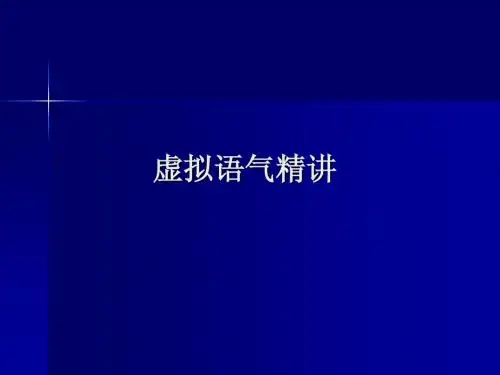
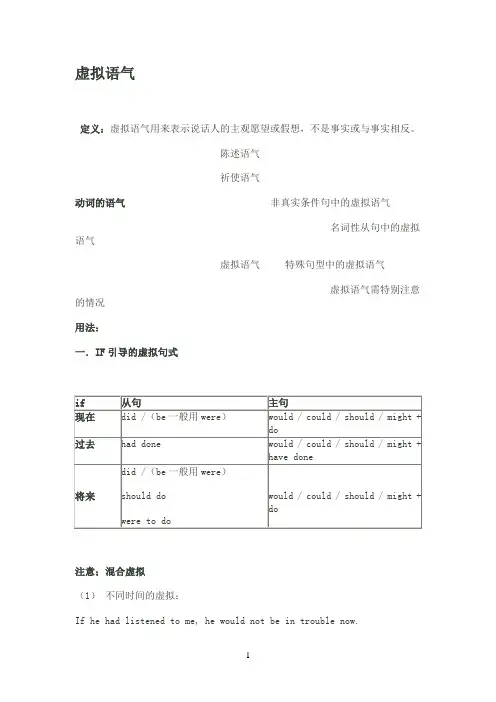
虚拟语气定义:虚拟语气用来表示说话人的主观愿望或假想,不是事实或与事实相反。
陈述语气祈使语气动词的语气非真实条件句中的虚拟语气名词性从句中的虚拟语气虚拟语气特殊句型中的虚拟语气虚拟语气需特别注意的情况用法:一.IF引导的虚拟句式注意;混合虚拟(1)不同时间的虚拟:If he had listened to me, he would not be in trouble now.If he had told me yesterday, I should know what to do now.(2) 虚拟与陈述的混合:He could have passed the exam, but he wasn’t careful enough. You should have come earlier, the bus left a moment ago.二.名词性从句中的虚拟语气:从句谓语动词(should) +do1.主语从句:it is + adj + that结构2.宾语从句:主语+要求接虚拟语气的动词+that一个坚持:insist两个命令:order; command 两个决定:decide; determine三个建议:suggest; advise; propose四个要求:demand; ask; request; require注意:① suggest:暗示;insist:坚持说(不虚拟)② except, believe, think suspect等动词的否定形式或疑问句后面的宾语从句要用虚拟。
I never thought that he should be such a brave young solider③ should竟然I am glad that your novel should have won the first prize.④ wish引导从句的虚拟语气,谓语动词变化和if从句虚拟语气一样。

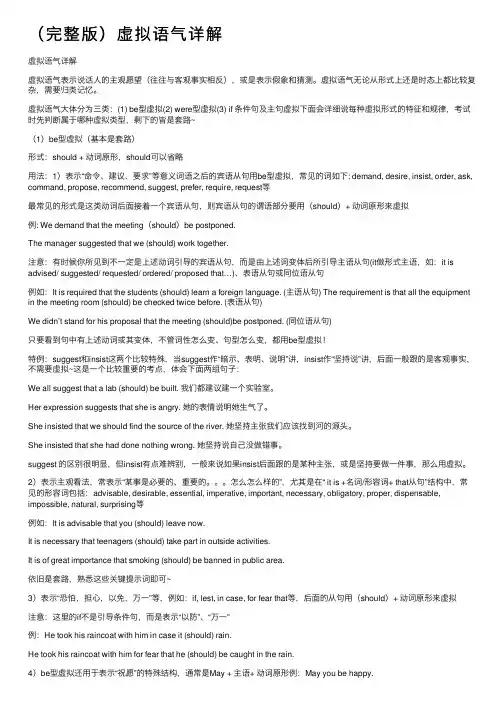
(完整版)虚拟语⽓详解虚拟语⽓详解虚拟语⽓表⽰说话⼈的主观愿望(往往与客观事实相反),或是表⽰假象和猜测。
虚拟语⽓⽆论从形式上还是时态上都⽐较复杂,需要归类记忆。
虚拟语⽓⼤体分为三类:(1) be型虚拟(2) were型虚拟(3) if 条件句及主句虚拟下⾯会详细说每种虚拟形式的特征和规律,考试时先判断属于哪种虚拟类型,剩下的皆是套路~(1)be型虚拟(基本是套路)形式:should + 动词原形,should可以省略⽤法:1)表⽰“命令、建议、要求”等意义词语之后的宾语从句⽤be型虚拟,常见的词如下: demand, desire, insist, order, ask, command, propose, recommend, suggest, prefer, require, request等最常见的形式是这类动词后⾯接着⼀个宾语从句,则宾语从句的谓语部分要⽤(should)+ 动词原形来虚拟例: We demand that the meeting(should)be postponed.The manager suggested that we (should) work together.注意:有时候你所见到不⼀定是上述动词引导的宾语从句,⽽是由上述词变体后所引导主语从句(it做形式主语,如:it is advised/ suggested/ requested/ ordered/ proposed that…)、表语从句或同位语从句例如:It is required that the students (should) learn a foreign language. (主语从句) The requirement is that all the equipment in the meeting room (should) be checked twice before. (表语从句)We didn’t stand for his proposal that the meeting (should)be postponed. (同位语从句)只要看到句中有上述动词或其变体,不管词性怎么变、句型怎么变,都⽤be型虚拟!特例:suggest和insist这两个⽐较特殊,当suggest作“暗⽰、表明、说明”讲,insist作“坚持说”讲,后⾯⼀般跟的是客观事实,不需要虚拟~这是⼀个⽐较重要的考点,体会下⾯两组句⼦:We all suggest that a lab (should) be built. 我们都建议建⼀个实验室。
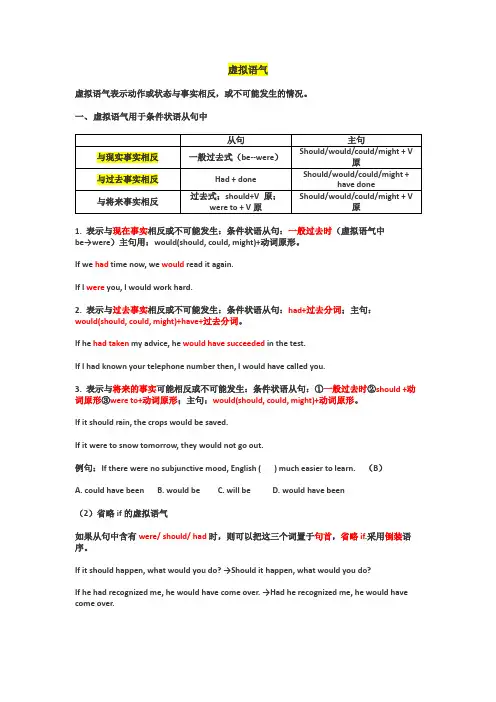
虚拟语气虚拟语气表示动作或状态与事实相反,或不可能发生的情况。
一、虚拟语气用于条件状语从句中从句主句与现实事实相反一般过去式(be--were)Should/would/could/might + V原与过去事实相反Had + done Should/would/could/might +have done与将来事实相反过去式;should+V 原;were to + V原Should/would/could/might + V原1. 表示与现在事实相反或不可能发生:条件状语从句:一般过去时(虚拟语气中be→were)主句用:would(should, could, might)+动词原形。
If we had time now, we would read it again.If I were you, I would work hard.2. 表示与过去事实相反或不可能发生:条件状语从句:had+过去分词;主句:would(should, could, might)+have+过去分词。
If he had taken my advice, he would have succeeded in the test.If I had known your telephone number then, I would have called you.3. 表示与将来的事实可能相反或不可能发生:条件状语从句:①一般过去时②should +动词原形③were to+动词原形;主句:would(should, could, might)+动词原形。
If it should rain, the crops would be saved.If it were to snow tomorrow, they would not go out.例句:If there were no subjunctive mood, English ( ) much easier to learn. (B)A. could have beenB. would beC. will beD. would have been(2)省略if的虚拟语气如果从句中含有were/ should/ had时,则可以把这三个词置于句首,省略if.采用倒装语序。
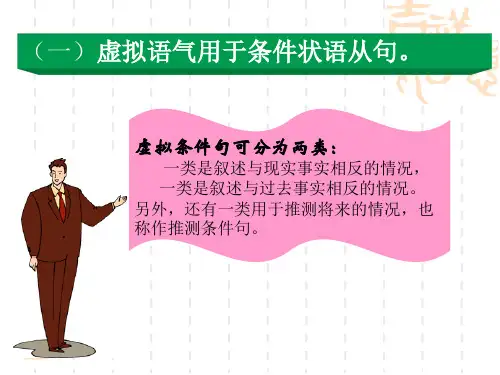
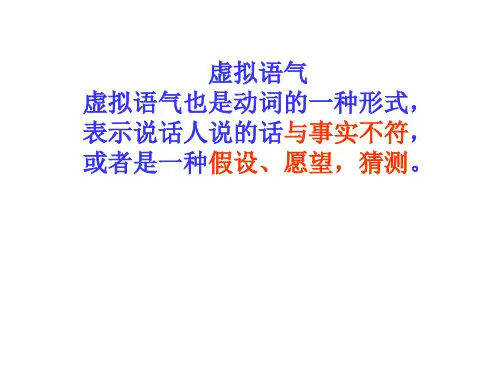

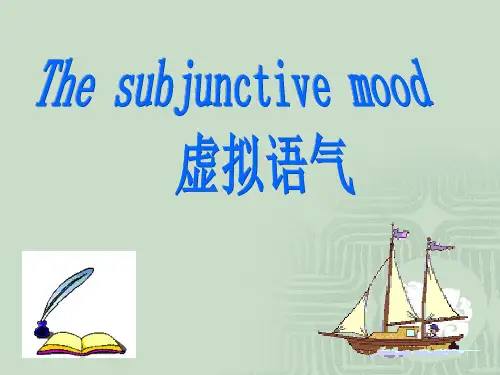
虚拟语气一、考点聚焦1、虚拟语气用于条件状语从句中(1)表示与现在事实相反的假设,条件状语从句中的谓语动词用“过去式(be动词的过去式用were)”,而主句中的谓语动词用“would / should/ could / might + 动词原形”。
如:If I were a boy, I would join the army.If the had time, she should go with you.(2)表示与过去的事实相反,条件状语从句中的谓语动词用过去完成时,主句中的谓语动词则用“would / should / might / could + have +过去分词”。
如:If he had taken my advice, he would have succeeded in the competition.(3)表示与将来事实相反,条件状语从句中的谓语动词一般过去时或should(were to) + 动词原形,而主句中的谓语动词则用would / should/could might + 动词原形。
如;If it were to rain tomorrow, the football match would be put off.(4)当条件状语从句表示的行为和主句表示的行为所发生的时间不一致时,动词的形式要根据它所表示的时间作相应调整。
如:If they had worked hard, they would be very tired.(从句说的是过去,主句指的是现在)Were I a boy, I would join the army.Had he taken my advice, he would have succeeded.Were it not for the expense, I would go to Britain.2、虚拟语气用于名词性从句(1)虚拟语气在宾语从句中的运用。
高中语法精讲虚拟语气(1)对现在的虚拟If从句主句did/were would/should/could/might doIf I were you, I would tell her the truth.=Were I you, I would tell her the truth.If条件句的倒装:去掉if, 句子部分倒装(半倒装,即以前学过的一般疑问句的语序)备注虚拟语气中,不管主语是不是单数都用were(2)对过去的虚拟If从句主句had done would/should/could/might have doneIf you had taken my advice, you would have passed the exam.=Had you taken my advice, you would have passed the exam.省略if(3)对将来的虚拟If从句主句did/should do/were to do would/should /could/might doIf he didn't come tomorrow, we would put off the meeting.=If he should come tomorrw, we would put off the meeting.=If he were to come tomorrw, we would put off the meeting.总结主过将从过主过将完从过完[例1](陕西卷)If we ___the other road, we might have arrived here in time for the meeting.A. takeB. had takenC. tookD. have taken答案B主句是过将完,所以从过完,过去完成时[例2](天津卷)--John went to the hospital alone.--If he___me about it, I would have gone with him.A. should tellB. tellsC. toldD. had told答案D[例3] (2013重庆)- It rained cats and dogs this morning. I'm glad we took an umbrella.- Yeah, we would have got wet all over if we__A. hadn'tB. haven'tC. didn'tD. don't答案A省略特殊情况①错综时间条件句例: If you had followed my advice just now, you would be better now.If you had studied hard before, you would be a college student now.做题时注意:动词的形式根据它所表示的时间作出相应的调整。
英语的虚拟语气知识点讲解一、虚拟语气的概念。
虚拟语气是一种特殊的动词形式,表示所说的话不是事实,而是一种假设、愿望、怀疑、推测或与事实相反的情况等。
二、虚拟语气在非真实条件句中的用法。
1. 与现在事实相反。
- 条件从句的谓语动词用一般过去式(be动词一般用were),主句的谓语动词用“should/would/could/might + 动词原形”。
- 例如:If I were you, I would take an umbrella.(实际上我不是你)2. 与过去事实相反。
- 条件从句的谓语动词用“had + 过去分词”,主句的谓语动词用“should/would/could/might+have +过去分词”。
- 例如:If he had taken my advice, he would have passed the exam.(实际上他没听我的建议,也没通过考试)3. 与将来事实相反。
- 条件从句的谓语动词有三种形式:一般过去式、“should+动词原形”、“were to+动词原形”,主句的谓语动词用“should/would/could/might +动词原形”。
- 例如:If it rained/were to rain/should rain tomorrow, we would not go out.三、虚拟语气在宾语从句中的用法。
1. wish后的宾语从句。
- 表示与现在事实相反的愿望,从句谓语动词用一般过去式(be动词用were)。
例如:I wish I were a bird.(实际上我不是鸟)- 表示与过去事实相反的愿望,从句谓语动词用“had+过去分词”。
例如:Iwish I had seen the film yesterday.(实际上昨天没看这部电影)- 表示与将来事实相反的愿望,从句谓语动词用“would/could/might+动词原形”。
例如:I wish I could fly to the moon tomorrow.2. 在表示建议、要求、命令等意义的动词后的宾语从句中(如suggest, advise, demand, require, order等)- 从句谓语动词用“should+动词原形”,should可以省略。